|
A Blog about Sensory Processing Sensitivity from the Worldview of a High-Sensing Male
Total words 909, Time to read 3 minutes 49 seconds Handling romantic rejections with care is important for everyone, but it's especially crucial when dealing with Highly Sensitive (HSM) men. These individuals experience emotions deeply and can be more affected by romantic setbacks. You can approach these situations with empathy and respect by understanding their unique needs. Sometimes Bluntly is Better When it comes to rejecting an HSP man, straightforwardness can often be the most compassionate approach. Being clear and direct helps avoid misunderstandings and provides a solid foundation for moving forward. Ambiguity can lead to prolonged hope and confusion, making the process more painful. For example, saying, "I appreciate your feelings, but I don't see a romantic future for us," is clearer than vague statements like, "I'm not sure what I want right now." If you are an HSP as well, this can be difficult as your empathy engines may be firing. No one wants to hurt someone else, but seeing the big picture may be helpful. Remember that the earlier you catch this, the less likely it is that deeper feelings will form. Don't Lead Them On Leading someone on can be harmful, especially because they are perceived as "too nice" to handle the truth. HSP men value honesty and are capable of handling it. Being upfront about your feelings prevents unnecessary emotional pain and allows them to start the healing process sooner. Avoid actions that could be misinterpreted as interest, such as excessive texting or spending one-on-one time if your feelings aren't mutual. Put yourself in their shoes. They are looking for confirmation, especially when the situation is ambiguous. Giving them anything to anchor their feelings on may be the cruelest cut of all. Don't Let It Progress Too Far if You Are Not Interested If you recognize early on that you are not interested, it's important to address it promptly. Early indicators such as lack of emotional connection or differing life goals should be acknowledged. Gently halting the progression before deeper feelings develop is kinder in the long run. A conversation like, "I've enjoyed getting to know you, but I don't feel a romantic connection," can prevent deeper hurt. Tips for Sensitive Men's Hearts Understanding the emotional depth of HSP men is crucial when approaching this conversation. Speak with empathy and acknowledge their feelings. Use gentle language and be mindful of the timing and setting of your conversation to ensure it's as comfortable as possible for them. Choose a private, quiet place where they feel safe, and approach the discussion with warmth and care. You may have to lead on this conversation, as they may be avoiding this difficult conversation so as not to confirm what they may suspect to be true. We Can Handle the Truth HSP men, while deeply sensitive, are also resilient. They prefer to know the truth rather than being left in uncertainty. Honesty shows respect for their emotional capacity and allows them to process and move forward in a healthy way. Clearly stating your feelings with kindness will enable them to start healing and prevents lingering doubt or false hope. Don't Be Mean to Make It Easy Being harsh or cruel in an attempt to make the rejection easier can backfire. While you might think it will help them get over you faster, it often leads to more hurt and confusion. Approach the conversation with kindness and respect to help facilitate a smoother transition. Avoid saying things meant to wound, like, "You're just too sensitive," which can damage self-esteem. Ways to Stay Friends if Love is Not Your Interest If you value the person and wish to stay friends, communicate this clearly. Set boundaries to ensure both parties are comfortable and respectful of the new dynamic. It's possible to maintain a positive friendship with time and mutual effort. For instance, suggest group activities instead of one-on-one time initially to help redefine the relationship. Give them time to recategorize the relationship from romantic to platonic and let them lead on the friendship front. Let Him Go if He Needs to Process Out Recognize that an HSP man might need space to process his emotions after a rejection. Support his need for time without pressuring him to maintain immediate contact. Giving him this space can help him heal and eventually, if desired, return to a friendship. Let him know it's okay to take the time he needs and that you'll be there if and when he's ready to reconnect. Remember, you are not responsible for his misplaced feelings. But that does not mean you have to be insensitive. You may be spurning his affections for many reasons; you need not explain them all but recognize he may feel rejection, and subsequent uncharacteristic behaviors may result depending on his emotional maturity. Give him space, for both of your sakes. Be Honest Above all, honesty is key in matters of romantic rejection. It builds respect and trust, even in difficult situations. Being honest about your feelings provides clarity and dignity to yourself and the HSP man. Honest communication fosters a mutual understanding and leaves less room for resentment or misunderstandings. Conclusion Letting an HSP man down gently and respectfully involves a combination of empathy, honesty, and clear communication. Understanding their unique needs and approaching the situation with care can help minimize hurt and foster a sense of mutual respect. In all relationships, the value of empathy and honesty cannot be overstated. Embrace these principles to ensure a considerate and respectful approach to romantic rejections.
0 Comments
A Blog about Sensory Processing Sensitivity from the Worldview of a High-Sensing Male
Total words 1099, Time to read: 6 minutes 0 seconds Highly Sensitive Persons (HSPs) hold a special place in the realm of creativity. Their innate ability for deep processing, keen observation, emotional acuity, and sensitivity to subtleties allows them to produce art that resonates deeply with others. Many renowned artists, including Robin Williams, Steve Martin, Elton John, John Lennon, Neil Young, and others, have been considered highly sensitive, contributing immensely to the richness of art and culture. Recently, I viewed a documentary on the life and times of Steve Martin, the American comedian. I have always enjoyed his absurdist, "wild and crazy guy" comedy. I watched his act in the early days after he began touring college campuses in the 70s. He appeared so cool and in control of things. In fact, after his appearance at the campus student center, he led a bunch of us students out onto the back of the Golden Spur, where an empty fountain area became a human swimming pool. We passed him around over our heads like a frenzied mosh pit, and I was amazed at his ability to control a drunk and stoned college crowd like the pied piper. I left shortly after that, but the antics continued. He led the diminishing crowd off the campus into a McDonalds, with one hundred students in tow, and ordered one French fry. Not a bag, but one French fry to the crowd's delight and the poor clerk's consternation, who had to explain they didn't serve singular fries. These antics later appeared in an article in Rolling Stone magazine featuring an interview with Martin. The documentary highlighted some of these acts of comedy. Still, it wasn't until later in the documentary, when it was revealed more about Martin's shyness, introversion, and sensitivity, that I realized the heavy toll it took on his personality to be the star he had always craved. Many highly sensitive people are ironically drawn to become celebrities, largely fueled by desires for acceptance and driven by our unique creativity. The price to be paid is often heavy, including seclusion, depression, drug and alcohol abuse, and sometimes unfortunately, an early death. This blog is dedicated to those brave souls who ventured beyond their comfort zones and dove headfirst into the pool of superstardom. Some survived, others didn't. The Creative Edge of Sensitivity Sensitivity in artists is not just a personality trait; it's a tool that enriches their creative process. It enables HSPs to see the world differently, feel emotions more intensely, and translate these experiences into their art, making it deeply nuanced and impactful. This unique perspective allows their work to touch people on a profound level, whether through painting, writing, acting, or any other form of artistic expression. The Price of Sensitive Creativity However, this sensitivity comes at a cost. The traits that fuel their creativity can also lead to significant personal challenges, especially when mixed with the pressures of fame and success. The intense depth of feeling and empathy can lead to overwhelm, depression, internal self-doubts, and loneliness. Furthermore, the struggle to balance sensitivity with the public scrutiny that often accompanies success can drive some to use and abuse drugs and alcohol as a coping mechanism. The Impact of Fame on HSP Artists The stories of many celebrated artists illustrate how fame can exacerbate the challenges HSPs face. For instance, the intense public spotlight and the demands of their careers have led many sensitive artists to confront personal turmoil, with some struggling in their battles with substance abuse and depression. These challenges underscore the complex relationship between sensitivity, creativity, and fame, highlighting the need for support and understanding. Preventative Measures and Coping Strategies Yet, the narrative that sensitivity must inevitably lead to suffering under the weight of success is one we can change. There are several strategies that HSP artists can employ to manage their sensitivity and mitigate the pressures of fame: - Setting Boundaries: Learning to say no and protecting personal time can help manage the overwhelm. It's not always about making more, doing more, and scaling new heights. Learning to take things in measured steps allows for assimilation. - Supportive Communities: Finding or creating communities that understand and share the HSP trait can provide invaluable support. I imagine it would not be hard to find fellow HSPs in the creative community. Education and acceptance will allow the HSP celeb to navigate the sometimes treacherous waters of fame. - Self-Care: Prioritizing self-care through mindfulness, exercise, and hobbies can help maintain mental and emotional balance. - Therapeutic Options: Counseling or therapy can offer strategies to manage sensitivity and the challenges that come with it. Redefining Success for the Sensitive Artist Success for the HSP artist does not have to mean sacrificing well-being for art's sake. It's possible to redefine success to include personal fulfillment, balance, and mental health alongside artistic achievement. This redefinition encourages HSP artists to strive for a model of success that honors their sensitivity as a strength rather than a hindrance. We must prevent the familiar script of tragic artists trampled by adoring fans and pressured by greedy and corrupt handlers. Conclusion The artistic contributions of HSPs are undeniably valuable, bringing depth, nuance, and emotion to the cultural landscape. While the challenges they face are real, HSP artists can navigate their paths to success without sacrificing their well-being with the right support and strategies. It's a call to action for the art community, mental health professionals, and society to provide the understanding and support sensitive artists need to thrive. The artists nourish our souls, and it's time we protected theirs. Additional Resources For HSP artists seeking support, consider exploring the following resources: - The Highly Sensitive Person by Dr. Elaine N. Aron: A book and website offering insights into the trait of high sensitivity. https://hsperson.com - Sensitive—The Untold Story: A documentary featuring the experiences of highly sensitive people, including artists. - Mindful: Offers resources on mindfulness practices that can help manage sensitivity. https://mindful.org - The National Coalition for Creative Arts Therapies Associations (NCCATA): Provides information on arts therapies that can be particularly beneficial for HSP artists. https://www.nccata.org/ - Online Communities: Platforms like Julie Bjelland's Sensitive Empowerment, The Highly Sensitive Refuge, and Jules DeVitto's Highly Sensitive Humans offer forums for HSPs to share experiences and find support. https://www.juliebjelland.com/ https://highlysensitiverefuge.com/ https://www.highlysensitivehumans.com/ The journey of the HSP artist is filled with both challenges and rewards. Recognizing the value of sensitivity in the creative process while also addressing the personal costs of this trait is essential. With support, understanding, and practical strategies for managing sensitivity, HSP artists can succeed without sacrificing, contributing their unique voice to the art world. A Blog about Sensory Processing Sensitivity from the Worldview of a High-Sensing Male
Total words 596, Time to read: 2 minutes 30 seconds Introduction Being a highly sensitive person (HSP) means experiencing the world with heightened depth of feeling. While this trait brings many gifts, such as deep empathy and rich emotional experiences, it also carries the risk of "loving things to death" – when deep affection becomes an obsession that can harm or destroy the object of that affection. For highly sensitive men, navigating the intensity of their emotions and finding a healthy balance in how they express love is crucial for their well-being and the well-being of those around them. Understanding Overattachment Overattachment is an excessive emotional or behavioral attachment to someone or something that goes beyond what is healthy or appropriate. In relationships, it may manifest as excessive neediness, jealousy, or attempts to control a partner's behavior. With hobbies or possessions, it can lead to an unhealthy fixation that consumes time and energy to the detriment of other aspects of life. For HSPs, overattachment often stems from a deep fear of loss, a need for control, and a tendency to seek identity and validation through external sources. As Dr. Elaine Aron, a leading researcher on high sensitivity, explains, "Highly sensitive people tend to form very deep attachments and can become highly invested in relationships, hobbies, or possessions, sometimes to an unhealthy degree." Real-world Examples of Overloving The consequences of overloving can be seen in various real-life scenarios: - Relationships: John, an HSP, constantly sought reassurance from his partner, bombarding her with texts and calls when they were apart. His partner felt smothered and eventually ended the relationship. - Hobbies: Miguel, an avid painter, became so consumed by his hobby that he neglected his work, social life, and personal well-being, leading to burnout and depression. - Possessions: Mark, an HSP with a fondness for vintage cars, spent countless hours and resources meticulously restoring a classic vehicle, but never drove it for fear of damaging it. The Consequences of Loving Too Much Overloving often stems from a genuine place of deep affection, but it can paradoxically lead to the loss or destruction of the very thing one is trying to protect. Strained relationships, personal unhappiness, and a sense of emptiness or lack of fulfillment are common consequences. Research on attachment styles has shown that insecure attachment patterns, such as anxious or avoidant attachment, can contribute to unhealthy relationship dynamics and lower overall well-being. Strategies for Balanced Affections 1. Self-awareness: Recognizing your patterns of overattachment and the triggers that exacerbate these behaviors is the first step towards change. Journaling, self-reflection, and seeking feedback from trusted loved ones can help develop this self-awareness. 2. Setting Boundaries: Establish healthy emotional and physical boundaries in relationships and other areas of interest. This may involve communicating needs clearly, setting limits on time and energy spent, and respecting each other's autonomy. 3. Mindfulness Practices: Mindfulness and meditation can help HSPs manage the intensity of their emotions and foster a sense of detachment from obsessive thoughts and behaviors. "Mindfulness allows us to observe our thoughts and feelings without getting caught up in them," says mindfulness expert Dr. Jon Kabat-Zinn. 4. Finding Diversity in Attachments: Instead of investing all emotional energy into a single person, hobby, or possession, strive to diversify your interests and emotional investments. This can help reduce the risk of overloving any one thing. 5. Seeking Support: Therapists, support groups, and communities of fellow HSPs can provide guidance and understanding in navigating deep feelings and tendencies towards overattachment. Healthy Ways to Show Love and Affection Expressing deep love and affection does not have to come at the expense of respecting the autonomy and freedom of the loved one, hobby, or possession. Communication, understanding each other's needs and boundaries, and finding healthy outlets for emotional expression are key. "True love is not possession, but appreciation and respect," says relationship expert Dr. John Gottman. "It's about cherishing the other person's individuality and allowing them the space to grow and thrive." Conclusion For highly sensitive men, the depth of emotion they experience can be both a blessing and a challenge. Recognizing when deep affection becomes detrimental is crucial for personal well-being and maintaining healthy relationships. By cultivating self-awareness, setting boundaries, practicing mindfulness, diversifying emotional investments, and seeking support, HSP men can learn to love deeply and wisely, without suffocating or destroying the objects of their affection. Reflect on your own patterns of affection and consider implementing the strategies discussed. Embrace the gift of high sensitivity while pursuing balanced and healthy relationships with the people, hobbies, and possessions you cherish. References Aron, E. N. (1996). The highly sensitive person: How to thrive when the world overwhelms you. Broadway Books. Gottman, J. M., & Silver, N. (2015). The Seven Principles for Making Marriage Work. Harmony. Kabat-Zinn, J. (2013). Full catastrophe living: Using the wisdom of your body and mind to face stress, pain, and illness. Bantam Books. Mikulincer, M., & Shaver, P. R. (2007). Attachment in adulthood: Structure, dynamics, and change. Guilford Press. A Blog about Sensory Processing Sensitivity from the Worldview of a High-Sensing Male
Total words 1326, Time to read: 5 minutes 34 seconds Note: Romantic love can be one of humans' most enjoyable and satisfying experiences. However, navigation to that end is often fraught with challenges and pitfalls. I believe HSPs are naturally more romantic or at least drawn to matters of the heart, and yet, we don't always reach our objective: to love and be loved. High emotion for us often seems to be leavened with naivety and idealization. It may be the price we pay for being so intensely emotional. We love more deeply, and sometimes we hurt more profoundly. Learning to be present in our emotions may help. In the complex landscape of love and relationships, idealizing love interests can be a tempting pitfall for Highly Sensitive Men (HSP). This blog explores the alluring world of idealization and its dangers, contrasting it with the key to healthier love expectations. The Allure of Idealizing Love Interests Why HSP Men Are Prone to Idealizing Love Interests Highly Sensitive Men possess a heightened emotional awareness, which can make them more susceptible to idealizing love interests. Research has shown that HSP individuals often have deeper emotional experiences and are more likely to attach intense emotions to people they are attracted to (Aron & Aron, 1997). But we know that. The Allure of Creating a Perfect Image Creating an idealized image of a love interest is appealing because it provides a temporary escape from the complexities and imperfections of real life. It also plays right into our fantasies about love, sometimes deviating from reality. A study published in the Journal of Personality and Social Psychology (Fletcher et al., 1999) suggests that idealization can be a form of self-protection, shielding individuals from potential disappointments. And yet, we are the co-creators of that gambit and the authors of possible heartbreak. Dangers of Idealizing Love Interests Emotional Upset Idealizing love interests often leads to unrealistic emotional attachment. Research (Birnbaum, 2019) highlights how this emotional intensity can lead to heightened anxiety, jealousy, and a fear of rejection, resulting in emotional upset. It's as if we are stirring our emotional cauldron. I once wrote that I sometimes believe that HSPs are addicted to emotion. We complain about the highs and lows even while we position ourselves for emotional rollercoasters. Our search for the emotional charge stimulates us with emotional current. Unfulfilled or Unhealthy Love Relationships Idealization can lead to rushing into relationships, ignoring red flags or incompatibilities. Individuals who idealize their partners may find themselves in relationships marked by poor communication and unrealistic expectations. When translated into an emotional interaction, our unrealistic expectations may hit a wall surrounding our love interest, preventing real love from prospering. We immediately jump the shark diving into the emotional pool and immediately release rational and critical thought from the process. Can you imagine anything going wrong here? The Risk of Embarrassment Building excessively high expectations that may not be met can lead to embarrassment. Fletcher et al., 2001 found that idealization often results in disillusionment when reality falls short of the imagined perfection. Running the risk of showing your hand too soon in the buildup of a relationship can often lead to awkward moments, which may expose your miscalculations and interpretations of your love interest's gestures. Nothing is more sad or embarrassing than unrequited love or misinterpretation of a potential lover's offering of friendship. Misreading Signs Idealizing love interests can lead to patterns of misjudgment, clouding one's perception and making it difficult to read the signs of affection or disinterest accurately. A study in the Journal of Research in Personality (Reis et al., 2015) indicates that individuals who idealize their partners are more likely to misinterpret their actions and intentions. Seeking love in all the wrong places leads to frustration, sometimes anger, and compounds feelings of loneliness. Seeing love where there is none, expecting that your HSP observation and awareness skills are always accurate, and failing to properly test your assumptions as you get to know a potential lover leads to disappointment. Disappointment and Heartbreak The ultimate consequence of idealization is disappointment and heartbreak. Pistole & Roberts, 2018 found that idealization was linked to higher levels of relationship dissatisfaction and breakups. It kind of supports the notion of a hopeless romantic, in love with the high created by the chase but unprepared for the disappointing trough of rejection. Healthy Love Expectations Getting to Know Someone Slowly Research in the Journal of Social and Personal Relationships (O'Sullivan et al., 2018) suggests that taking time to understand a potential partner leads to more successful and satisfying relationships. Building a strong foundation is essential for long-term happiness. Slow wins the race, but our idealization of romantic love stories, often seen within a TV or movie timeframe of two hours or less (read: Immediate gratification), makes us believe that love happens with lightning speed. Getting to know anyone takes time - months or even years. Idealization in love is like a match tip: burns bright, lights up the room for a second, then flames out, leaving nothing but the acrid smell of smoke. Not built to last. Managing Loneliness Addressing loneliness without idealizing someone is crucial for HSP men. Loneliness is the HSP two-edged sword. We crave our private time, but at some point, we recognize our social selves need to be fed. What better connection for an HSP to enter than an intimate one-on-one relationship? Often, we have less experience than other outgoing individuals in making these bonds. We often fail to field test our social theories and make naïve assumptions about other's responses to us. Yet, we must. Practice is in the doing. Research published in Health Psychology (Cacioppo et al., 2006) indicates that finding ways to connect with friends, engage in hobbies, and create a fulfilling life outside of a romantic relationship is important for overall well-being. Building the skills that many of us lack. Watching for Red Flags or Disinterest We tend to be good at observational details. However, projecting externally strong emotions doesn't always allow us to be objective. A study in the Journal of Personality and Social Psychology Bulletin (Fletcher & Simpson, 2017) shows that paying attention to red flags and addressing incompatibilities early can lead to more stable and satisfying relationships. It is important to know your relationship's red flags. More importantly, you must know what action to take when a red flag appears. Failure to do so, from my personal experience, is a failed strategy. And, wallpapering those red flags with idealization does not make them disappear. Avoiding Direct Conversation and Truthfulness It is important to emphasize the importance of open and honest communication in relationships. Addressing concerns and initiating difficult conversations is vital to foster understanding and connection. Better sooner than later. In love, we often try to present our best selves and may avoid addressing pitfalls in the relationship that may stand out, even in the very beginning. By not committing too early, we can be cautious and let the slow reveal occur without pressure and pumped-up expectations. Knowing When to Move Forward Recognizing when a relationship is progressing positively and taking things at a comfortable pace is vital. Individuals in balanced and healthy relationships tend to be more satisfied and content. Perhaps formulating milestones for yourself and between you and your partner can make the thousand-mile journey seem more palatable. Each milestone may correspond with an emotional release correlating with a growing love and commitment. Not to be robotic in this endeavor, but present and aware of the relationship as it is at a point in time. Conclusion Idealizing love interests may seem enticing, but it often leads to emotional upset, unfulfilled relationships, embarrassment, misreading signs, and heartbreak. Highly Sensitive Men can find a more fulfilling path by adopting healthier love expectations, building strong foundations, managing loneliness, staying vigilant for red flags, communicating openly, and recognizing when to move forward. By embracing a balanced and realistic perspective, HSP men can forge happier, more authentic relationships, ultimately leading to a more satisfying love life. A Blog about Sensory Processing Sensitivity from the Worldview of a High-Sensing Male
Total words 834, Time to read: 3 minutes 30 seconds In a world filled with constant noise and distractions, the practice of self-reflection and self-talk can be a rare and valuable gift, especially for highly sensitive men. This guide explores the art of self-talk, debunking misconceptions, and highlighting its profound impact on emotional well-being for those with heightened sensitivity. Defining Self-Talk At its core, self-talk is the internal dialogue we have with ourselves, whether it be thoughts, musings, or spoken words. It acts as a window into our emotions, beliefs, and perceptions, unveiling the complexity of our inner world. Self-talk is often misunderstood, with some labeling it as eccentric or indicative of instability. In truth, it is a natural and universal practice that warrants appreciation rather than judgment. The Link Between Self-Talk and Highly Sensitive Men Highly sensitive men possess a unique ability to experience emotions on a deeper level. Thus, self-talk becomes indispensable for comprehending and navigating their rich emotional landscape. Talking to Yourself: Is It Normal? Contrary to misconceptions, self-talk is an ordinary phenomenon experienced by people from all walks of life. Understanding its universality helps break down the walls of judgment. Embracing self-talk offers numerous advantages, including heightened self-awareness, improved decision-making, and increased emotional intelligence. Let us challenge the stigma surrounding self-talk and encourage its acceptance as a powerful tool for emotional growth and self-discovery. The Contemplative Nature of Highly Sensitive Men High sensitivity is not a weakness but a gift. By embracing it, highly sensitive men can develop a profound understanding of themselves and the world around them. For highly sensitive men, self-talk delves deeper, often revealing layers of emotions and insights that aid in processing their experiences. The practice of self-reflection through self-talk enables highly sensitive men to build emotional resilience and cope effectively with challenging situations. Internal vs. External Self-Talk Internal self-talk involves silent contemplation within the mind, while external self-talk involves verbalizing thoughts aloud. Internal self-talk is a potent tool for introspection, enabling highly sensitive men to comprehend their emotions more deeply. External self-talk allows highly sensitive men to express their thoughts and feelings, providing a tangible outlet for their inner world and testing their self-theories in the outer world. Moments of solitude allow highly sensitive men to engage in self-talk without external distractions. Nature serves as a therapeutic backdrop, fostering emotional connection and providing clarity during private self-talk sessions. The privacy of one's home offers a safe and judgment-free space for highly sensitive men to explore their thoughts and emotions. Imaginary Self vs. Talking to Someone Else Engaging in imaginary self-talk allows highly sensitive men to explore different perspectives and solutions without fear of judgment. Conversing with real or fictional characters during self-talk encourages a fresh outlook, often leading to deeper insights and emotional release. We will explore how both forms of self-talk contribute to mental clarity, emotional processing, and problem-solving. Self-Talk as Rehearsal and Catharsis Self-talk serves as a rehearsal for challenging conversations, bolstering confidence and improving communication skills. Cathartic self-talk provides highly sensitive men with an emotional release, enabling them to process and resolve lingering emotions. Cathartic self-talk offers a path to emotional healing, fostering greater peace and well-being. The Therapeutic Benefits of Self-Talk for HSP Men Self-talk helps alleviate stress and anxiety, providing emotional relief during turbulent times. Self-talk empowers highly sensitive men to regulate their emotions, reducing the intensity of overwhelming emotional responses. By engaging in self-talk, highly sensitive men can cultivate deeper self-awareness, leading to greater personal growth and understanding. Embracing Self-Talk: Overcoming Embarrassment By releasing societal expectations, highly sensitive men can embrace self-talk as a valuable tool for emotional well-being. Normalizing self-talk among men encourages emotional openness and fosters a supportive environment for vulnerability. Embracing self-talk encourages vulnerability and authenticity, leading to more meaningful connections with oneself and others. Is Self-Talk Healthy for Highly Sensitive Men? Identifying healthy self-talk patterns allows highly sensitive men to foster emotional well-being and resilience. Recognizing negative self-talk habits empowers highly sensitive men to make positive changes and promote emotional growth. Striking a balance between self-talk and external interactions while practicing self-compassion ensures emotional health and well-being. Making Self-Talk a Practice: Tips for Clarity and Stress Relief Incorporating self-talk into daily routines helps highly sensitive men gain mental clarity and emotional balance. Practicing affirmations reinforces positive thinking and bolsters self-confidence. By incorporating self-talk into decision-making processes, highly sensitive men can make more informed and balanced choices. I encourage highly sensitive men to embrace self-talk as a powerful tool for emotional well-being and personal growth. Highlighting the significance of introspection and self-reflection to nurture emotional well-being. Promoting self-compassion as highly sensitive men embrace self-talk, fostering emotional growth and authentic living. By adopting the art of self-talk, highly sensitive men can embark on a transformative journey of self-discovery, emotional healing, and personal growth. Highly Sensitive Men can embrace their sensitivity as a gift through self-reflection and understanding and navigate life with newfound strength and resilience. So, take a moment today to have a little talk with yourself and explore the profound benefits it can bring to your life. A Blog about Sensory Processing Sensitivity from the Worldview of a High-Sensing Male
Total words 728, Time to read: 3 minutes 4 seconds Note: This past week, I lost my ninety-three-year-old mother. Despite her age, her passing surprised those of us who loved her. She was a constant guiding light for me and my sisters. And she will be sorely missed. I thought it might be helpful to add this blog to help other HSP men pass through the pathway of grief. Writing helps me focus on my thoughts and feelings, journaling from the soul. I will always love and never forget her, but as they say, this grief will one day pass to happy remembrances. Godspeed, Mom. Grief is a profound and challenging emotion that affects everyone differently. The grieving process can be particularly overwhelming for Highly Sensitive Men (HSP), who experience emotions more intensely. Being a Highly Sensitive Person means having deeper emotional responsiveness and empathy. When faced with losing a parent, HSP men may find themselves uniquely navigating grief, seeking understanding and support. In this blog, we will explore the impact of losing a parent, the grieving process for HSP men, how to understand their emotional perspective, and offer tips on embracing their feelings and overcoming the pain. The Impact of Losing a Parent Losing a parent is an emotionally significant event for anyone, but for HSP men, it can be even more impactful due to their heightened sensitivity. According to psychologist Dr. Elaine N. Aron, highly sensitive individuals may deeply process emotional experiences, leading to intense reactions to loss and grief. This heightened emotional sensitivity can result in a range of complex emotions, making the grieving process more challenging. The Grieving Process for HSP Men The grieving process is not linear; HSP men may experience it uniquely. The stages of grief, including denial, anger, bargaining, depression, and acceptance, can be amplified for HSP individuals. Understanding that grief is a personal journey and allowing oneself to grieve at their own pace is crucial for healing. Remembering that there is no "right" way to grieve is essential. Understanding the Emotional Perspective HSP men may encounter a mix of intense emotions during the grieving process, including profound sadness, vulnerability, and guilt. The feeling of vulnerability might stem from their empathetic nature, as they deeply connect with the emotions of others around them. It's essential to validate and reassure them that experiencing such feelings is a natural part of the healing journey, not a sign of weakness. Embracing the Expression of Feelings Society often expects men to be stoic and reserved, but for HSP men, openly expressing emotions is essential for healing. Breaking societal norms and embracing their feelings without judgment is empowering. Engaging in healthy emotional expression through writing, talking to a supportive friend, or seeking professional counseling can be immensely beneficial during this difficult time. Moving Through the Pain Coping with grief can be overwhelming, but there are strategies that can help HSP men navigate through the pain. Mindfulness practices, meditation, and creative outlets such as art or music can be therapeutic tools. Additionally, practicing self-compassion and self-care is vital for emotional well-being during this challenging period. Seeking Support HSP men don't need to navigate grief alone. They can turn to friends, family members, therapists, or grief support groups for understanding and comfort. Connecting with others who have experienced similar losses can provide a safe space to share feelings and experiences without judgment or misunderstanding. How Grieving Differs for HSP Men Grief for HSP men can be distinct due to their heightened sensitivity to environmental triggers and empathetic nature. While this may intensify the grieving process, it can also lead to deeper healing and a greater capacity for empathy and understanding. The Duration of Bereavement Grief does not follow a fixed timeline, and bereavement has no "right" or "wrong" duration. HSP men should be patient with themselves and allow their emotions to unfold naturally over time. As they embrace their sensitivity, they can learn to navigate grief in their unique way. Conclusion Grieving as a Highly Sensitive Man is a deeply personal and transformative experience. Acknowledging the impact of losing a parent, understanding the stages of grief, embracing emotions without judgment, and seeking Support are essential steps in the healing process. Remember, healing takes time, and it's okay to experience grief in a way that reflects individual sensitivity. By embracing their emotions and seeking Support, HSP men can find hope and resilience, moving forward with newfound strength and compassion. A Blog about Sensory Processing Sensitivity from the Worldview of a High-Sensing Male
Total words 397, Time to read: 1 minute 40 seconds Amid life's chaos, it's not uncommon for highly sensitive men to feel trapped in monotonous routines, stuck in a never-ending cycle. But just like the captivating rhythms of Jimmy Buffett's album, "Living and Dying in 3/4 Time," finding a harmonious balance requires a unique approach for highly sensitive individuals. This blog aims to provide guidance on breaking free from ruts, exploring new experiences, and embracing the vibrant tapestry of life. Recognizing the Ruts: Highly sensitive men often face challenges when caught in ruts. The repetitive nature of routines can profoundly impact their emotional well-being and personal growth. These individuals must cultivate self-awareness and recognize when they feel trapped or stagnant. Breaking Free: To escape the clutches of monotony, highly sensitive men can benefit from practical strategies for breaking free. Stepping outside their comfort zones and venturing into uncharted territory can be transformative. Embracing change, taking calculated risks, and challenging themselves to try new things can unlock a world of possibilities. Embracing Novel Experiences: Novel experiences can catalyze personal growth, increased self-confidence, and a broader perspective on life for highly sensitive men. Exploring unfamiliar territories through hobbies, travel, or artistic pursuits allows them to expand their horizons and tap into the richness of new encounters. Encourage readers to embrace the excitement of the unknown and discover the untapped potential within themselves. Building Resilience: Navigating novel experiences can evoke challenges and fears, but building resilience is essential for highly sensitive men. Cultivating self-compassion, setting realistic expectations, and seeking support from trusted friends or professionals can help overcome obstacles. Setbacks are part of the journey and can be transformed into valuable lessons along the way. Self-Care and Mindfulness: Highly sensitive men must prioritize self-care and mindfulness in their lives. Engaging in self-care practices such as meditation, journaling, and activities that bring joy and relaxation can restore emotional balance. Encourage readers to carve out time for themselves, recognizing that self-care is not selfish but necessary for their well-being. Conclusion: For highly sensitive men, navigating life's rhythms can be an intricate dance between living and dying in 3/4 time. Breaking free from ruts, embracing novel experiences, and prioritizing self-care are essential steps toward a fulfilling existence. Remember, the journey itself is a tapestry of growth and self-discovery. By embracing change and allowing themselves to explore uncharted paths, highly sensitive men can find their unique rhythm and thrive in their symphony of life. The Sensitive Man - Cultivating Gratitude: A Path to Inner Strength for Highly Sensitive Men5/31/2023 A Blog about Sensory Processing Sensitivity from the Worldview of a High-Sensing Male
Total words 816, Time to read: 3 minutes 26 seconds Being a highly sensitive man comes with unique challenges, but it also presents an opportunity for deep introspection and personal growth. In navigating the complexities of life, one powerful tool that can greatly enhance well-being is gratitude. Practicing gratitude allows highly sensitive men to shift their focus from the negatives to the positives, fostering a positive mindset and nurturing their overall emotional health. What is Gratitude, and How Does It Affect Highly Sensitive Men? Gratitude is more than just saying "thank you." It is a transformative practice that involves acknowledging and appreciating the blessings, big or small, in our lives. For highly sensitive men, cultivating gratitude can profoundly impact their attitude and emotional well-being. It enables them to shift their perspective, focusing on the abundance and positivity surrounding them rather than getting overwhelmed by their challenges. Gratitude also plays a crucial role in managing emotions and reducing stress, providing a sense of inner calm and balance. Methods of Practicing Gratitude
When to Practice Gratitude
Things to Be Grateful for as a Highly Sensitive Man You possess unique qualities and strengths worth celebrating as a highly sensitive man. Consider focusing your gratitude on the following:
Benefits of Practicing Gratitude and Developing a Daily Habit By incorporating gratitude into your daily life, you can experience a range of benefits, including:
Practicing gratitude is a transformative journey that can profoundly impact the lives of highly sensitive men. By focusing on the positives, expressing appreciation, and reflecting on the blessings in their lives, they can foster a positive mindset, cultivate inner strength, and nurture their overall well-being. Embrace the power of gratitude in your life, starting today. Begin each day with gratitude, end each day with reflection, and watch as your perspective shifts, opening doors to a more fulfilling and joyful existence. A Blog about Sensory Processing Sensitivity from the Worldview of a High-Sensing Male
Total words:1229, Time to read: 6.43 minutes Overcoming the Pain of Criticism: Techniques for Highly Sensitive Men to Grow and Thrive As a highly sensitive person, receiving criticism or rejection can feel particularly overwhelming and painful. The highly sensitive trait is characterized by a deeper level of processing, which can lead to greater emotional intensity and a tendency to take things to heart. However, highly sensitive men can cope with criticism and rejection effectively. In this blog post, we will explore the roots of the pain associated with criticism and rejection, techniques for processing it, and strategies for avoiding manipulative and harmful criticism. The challenge of coping with rejection and criticism For highly sensitive men, criticism and rejection can feel like personal attacks. This can trigger various emotions, including anger, sadness, and anxiety. Learning to cope with criticism and rejection can be particularly challenging for highly sensitive men, but it is essential for personal and professional growth. Roots of the pain associated with rejection and criticism Understanding the sensitive person's experiences Highly sensitive men may have experienced rejection and criticism as particularly painful in the past. This can be due to a range of factors, including childhood experiences, socialization, and personality traits. This might also include not "measuring up" to the expectation for masculine behavior. These experiences can lead to a deep-seated fear of rejection and criticism, making it difficult to process feedback objectively. How sensitivity plays a role in processing perceived "attacks" For highly sensitive men, criticism and rejection can feel like a vendetta against them personally. This is because the highly sensitive trait is characterized by a deeply personal way of processing emotional content, which can lead to greater emotional intensity. The ability to sense subtle physical, mental, and vocal hostilities or perceived hostilities makes some HSP Men more likely to see criticism as destructive versus constructive. This high sensitivity to criticism may cause protective emotional barriers to kick in and block the constructive nature of the criticism from coming through. This reaction can be a conditioned response based on memories of past negative criticisms and may seem spontaneous and intuitive. Highly sensitive men may also tend to take things to heart, making it difficult to separate criticism from the perceived pain of past experiences. In many ways, this is a knee-jerk reaction based on not learning to receive criticism as a helpful attempt to correct erroneous behavior and make the individual mindful of possible corrections. However, there is also a perfectionism streak in many HSPs that make them vulnerable to criticism. The expectation is that they have been conscientious about their performance and expect that it is perfect without externally testing that theory. In this case, perfectionism is the enemy of excellence. Separating criticism from perceived pain Remaining objective about criticism One of the key skills for coping with criticism and rejection is to remain objective. This means recognizing that criticism is not a personal attack but an opportunity to learn and grow. It is important to focus on the content of the feedback and not let the emotions associated with it overwhelm you. Sometimes many who deliver criticism are not educated in the skilled delivery of critique, so that it may come across as harsh or brusque. Detecting this difference can help HSPs understand to separate the critic from the criticism. Preparing mentally for criticism Another technique for coping with criticism is to prepare mentally for it. This can involve reminding yourself that feedback is an opportunity for growth and setting realistic expectations for the feedback you may receive. Practicing mindfulness techniques to stay calm and centered in the face of criticism can also be helpful. Staying calm under fire and seeing the bright side Staying calm in the face of criticism can be challenging for highly sensitive men. However, it is essential to separate criticism from the perceived pain. One technique for staying calm is focusing on the feedback's positive aspects. This simple switch in thinking can involve looking for constructive feedback and recognizing that the feedback is an opportunity to improve. Techniques for processing criticism and rejection Accepting feedback gracefully Gracefully accepting feedback is an essential skill for coping with criticism and rejection. In short, this means listening actively to the feedback, acknowledging it, and expressing gratitude for the feedback, even if you don't agree with it initially. Techniques to calm the mind to accept criticism objectively A range of methods can help calm the mind and accept criticism objectively. These include mindfulness meditation, deep breathing exercises, and cognitive-behavioral therapy (CBT). Stopping your internal dialogue long enough to listen actively is key to ensuring you understand the criticism. Developing a positive attitude toward criticism Developing a positive attitude towards criticism can be challenging for highly sensitive men. However, dissecting the criticism for opportunities to grow and focusing less on the delivery is essential. This step involves recognizing that criticism is an opportunity to learn and grow and concentrate on the constructive aspects of the feedback. Stay positive. Learning from criticism to achieve goals and objectives One of the key benefits of criticism is that it can help you achieve your goals and objectives. Learning from criticism involves recognizing the areas you need to improve and developing an action plan to address them. When in doubt, ask for help. Knowing that you can act on the criticism moves you from a place of helplessness to a position of control. In the end, if the complaint does not resonate with you, you can always reject it. Building a long-term strategy for dealing with criticism and rejection Dealing with criticism and rejection is a lifelong process, and it is important to develop a long-term coping strategy. Part of this can involve setting realistic expectations, practicing self-care, and seeking support from trusted friends and family members. Avoiding manipulative and harmful criticism Recognizing the difference between constructive and destructive criticism Not all criticism is created equal. It is important to recognize the difference between constructive and destructive criticism. Constructive criticism is feedback intended to help you improve, while destructive criticism is feedback meant to harm or manipulate you. Setting boundaries to protect oneself One way to avoid manipulative and harmful criticism is to set boundaries. This can involve recognizing your limitations and being assertive about your needs. It can also include identifying when criticism is not constructive and choosing not to engage with it or the person delivering the negative feedback. Conclusion Reiterating that highly sensitive men can learn to cope with criticism and rejection Learning to cope with criticism and rejection is challenging for everyone, but it can be particularly difficult for highly sensitive men. However, with the right techniques and strategies, developing the skills needed to cope is possible. Encouraging the use of techniques listed to process rejection and criticism productively The techniques listed in this blog post can be helpful for anyone who struggles with criticism and rejection. By remaining objective, preparing mentally, and focusing on the positive aspects of feedback, it is possible to process criticism productively and constructively. Empowering highly sensitive men to see criticism as an opportunity to grow By learning to cope with criticism and rejection, highly sensitive men can develop the skills needed to grow and achieve their goals. By recognizing that criticism is not a personal attack but rather an opportunity to learn and improve, highly sensitive men can use feedback to become their best selves. A Blog about Sensory Processing Sensitivity from the Worldview of a High-Sensing Male
Total words: 1101, Time to read: 4.38 minutes As a highly sensitive man (HSM), navigating social situations can be daunting. It's common for highly sensitive men to feel overwhelmed, anxious, and stressed out in social situations. However, it's important to remember that social skills are essential for success in both personal and professional life. This article will discuss tips for navigating social situations for highly sensitive men. Importance of Navigating Social Situations for Highly Sensitive Men Navigating social situations is crucial for highly sensitive men to build meaningful relationships, advance their careers, and improve their quality of life. Developing social skills can also help highly sensitive men cope with social anxiety and overcome shyness. Personal Social Situations Approaching personal social situations can be challenging for highly sensitive men. Here are some tips for navigating these situations:
Work Social Situations Navigating work social situations can be a challenge for highly sensitive men. Here are some tips for managing work-social situations:
Everyday Social Interactions Managing everyday social interactions can be a problem for highly sensitive men. So here are some tips for managing these interactions:
Ameliorating Overwhelm on the Fly in Social Situations Highly sensitive men may experience overwhelm in social situations. Here are some strategies for managing overwhelm on the spot:
Using High Sensitivity as a Strength in Stressful Social Situations Embracing High Sensitivity Many highly sensitive men view their sensitivity as a liability, something to be overcome or hidden. However, high sensitivity can be a valuable asset in social situations. By embracing your sensitivity and recognizing it as a unique trait, you can learn to use it to your advantage. Recognizing the Benefits of High Sensitivity High sensitivity can offer a unique perspective in social situations. HSPs are often more attuned to the emotions of others and can pick up on subtle social cues that others may miss. This can lead to increased empathy, understanding, and insight into social dynamics. Recognizing these benefits can help you to feel more confident in your social interactions. Finding Your Unique Strengths As a highly sensitive man, you likely have unique strengths that can be leveraged in social situations. Take some time to reflect on your strengths, whether it's your ability to connect with others on a deep level or your attention to detail. By recognizing your strengths, you can find ways to use them to your advantage in social situations. Feeling More Confident and Self-Assured in Social Situations Building Self-Confidence Building self-confidence can be difficult for highly sensitive men who may struggle with self-doubt and insecurities. However, taking small steps to build confidence can make a big difference. Practice positive self-talk, set achievable goals for yourself, and celebrate your successes. Practicing Self-Compassion Self-compassion is the practice of treating yourself with kindness and understanding. This can be especially important for highly sensitive men who may be hard on themselves for not meeting societal expectations or for feeling overwhelmed in social situations. By practicing self-compassion, you can learn to be more accepting of yourself and your sensitivity. Developing a Positive Mindset A positive mindset can help you approach social situations with a more optimistic outlook. Focus on the positive aspects of social interactions, such as the opportunity to connect with others or learn something new. Reframing your mindset can reduce social anxiety and make you feel more self-assured in social situations. Conclusion Recap of Tips for Navigating Social Situations Navigating social situations as a highly sensitive man can be difficult, but it is not impossible. By taking small steps to manage social anxiety, ameliorate overwhelm, and recognize the benefits of high sensitivity, you can learn to feel more confident and self-assured in social situations. Encouragement for Highly Sensitive Men To all the highly sensitive men out there, know that you are not alone. Many men struggle with social anxiety and overwhelm, and it is okay to feel this way. However, by embracing your sensitivity and finding ways to use it to your advantage, you can easily navigate social situations. Final Thoughts and Future Outlook Navigating social situations as a highly sensitive man is an ongoing journey. There will be ups and downs, successes and setbacks. However, with practice and patience, you can learn to manage social anxiety and feel more confident in your interactions with others. Remember to be kind to yourself and celebrate your progress along the way. |
AuthorBill Allen currently lives in Bend, Oregon. He is a certified hypnotist and brain training coach at BrainPilots.com. He believes that male sensitivity is not so rare, but it can be confounding for most males living in a culture of masculine insensitivity which teaches boys and men to disconnect from their feelings and emotions. His intent is to use this blog to chronicle his personal journey and share with others. Archives
July 2024
Categories
All
|

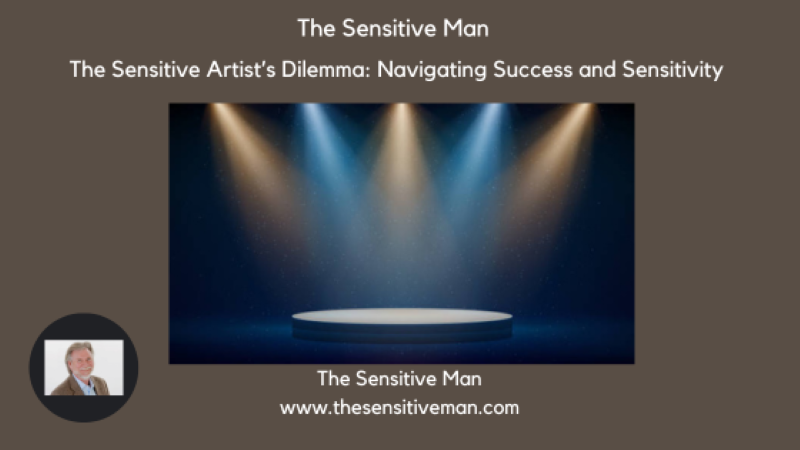
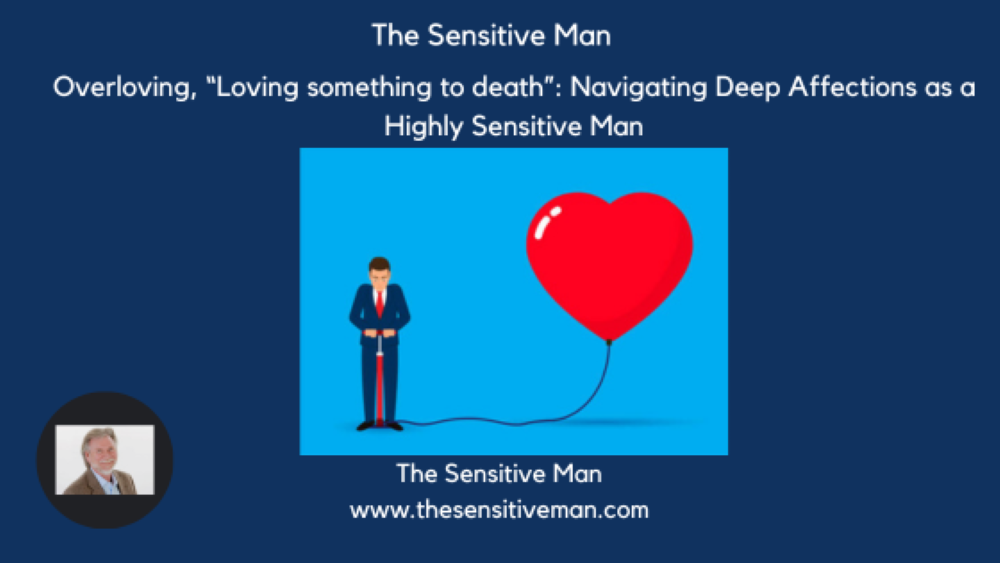
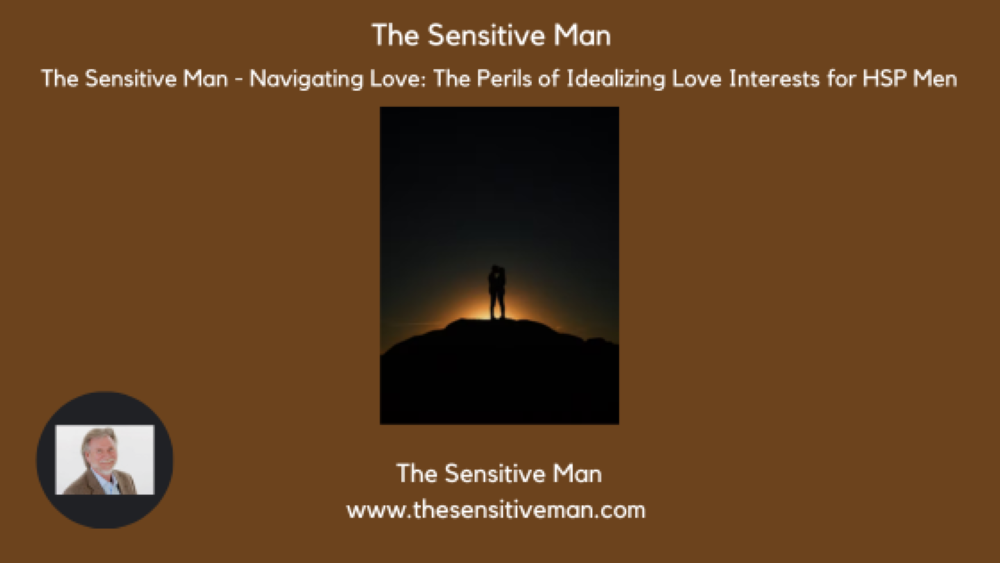
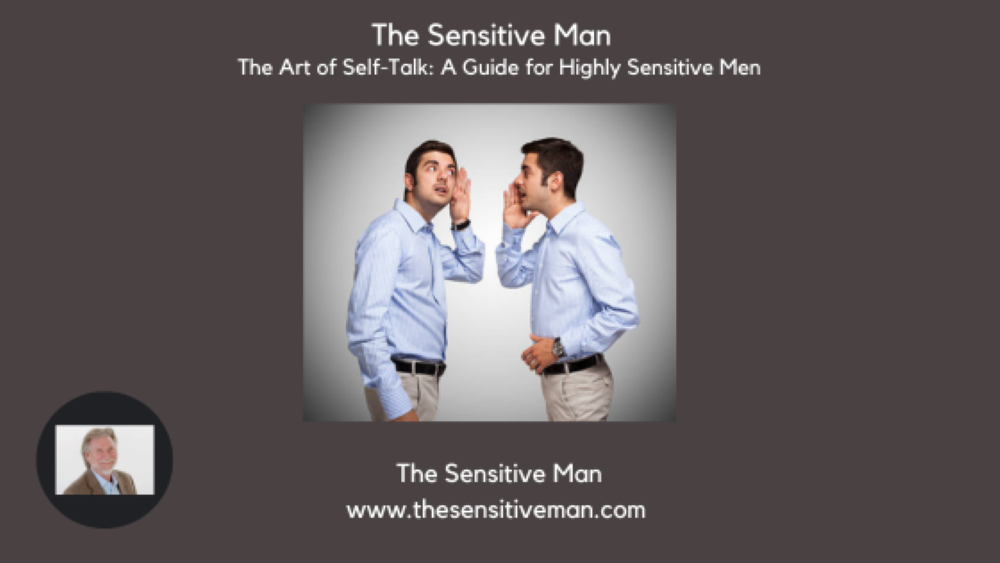
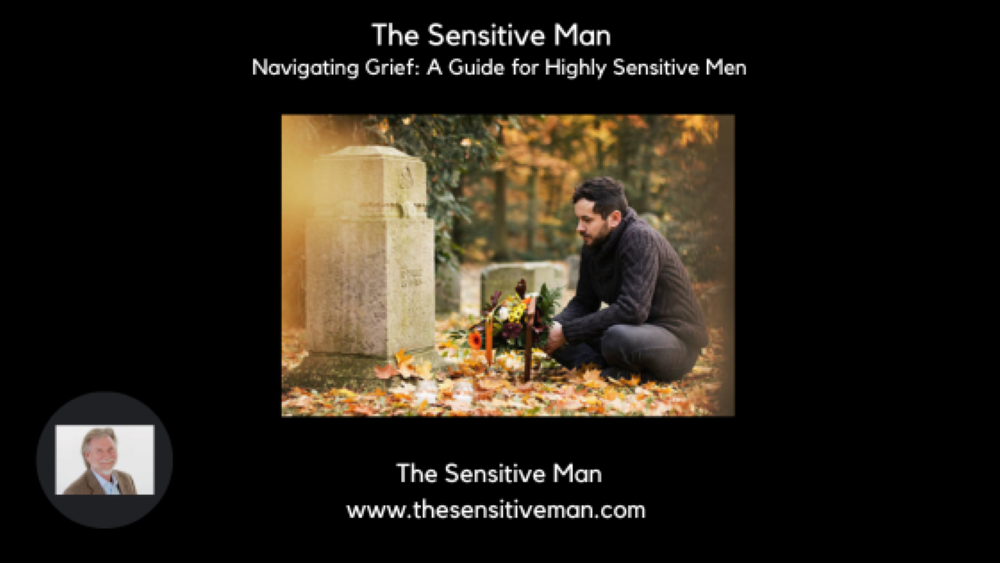
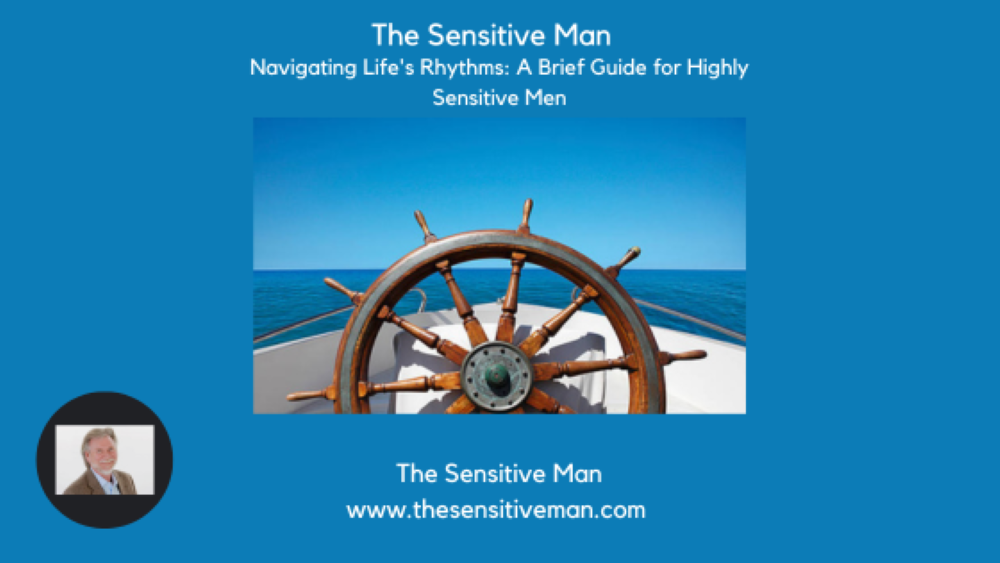
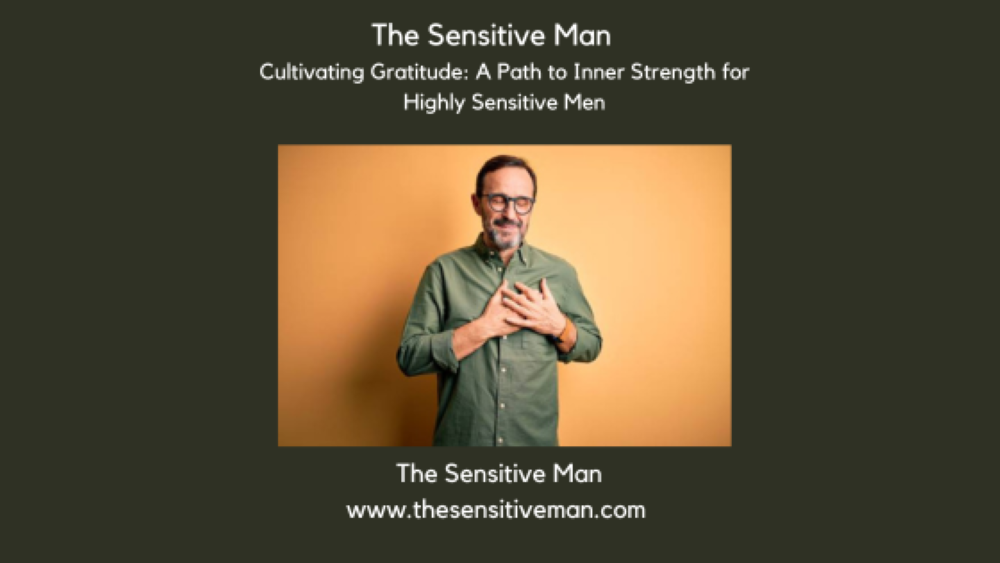
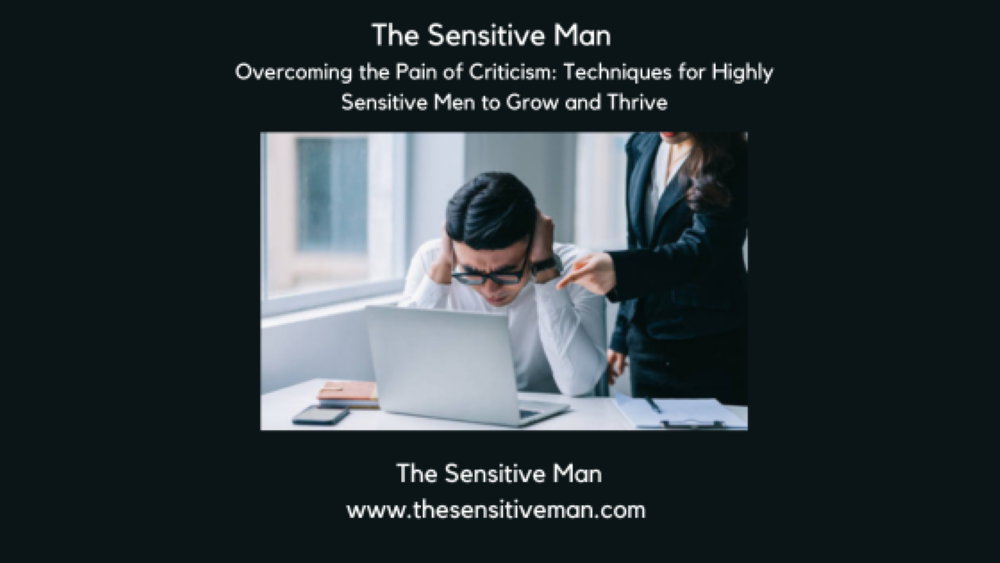
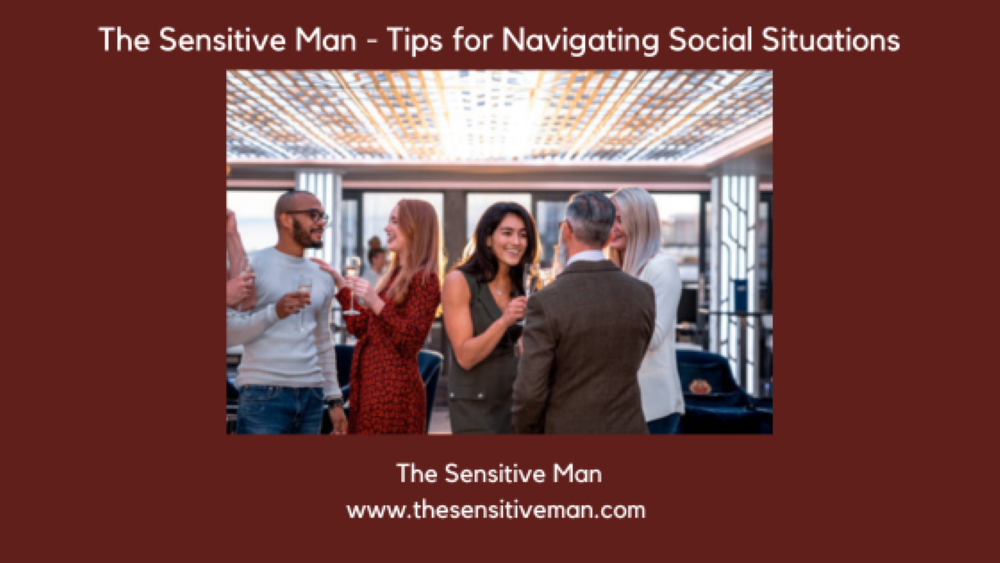

 RSS Feed
RSS Feed
